 Two days after the Americans came, a tall, hazlenut skinned student named James came to see me trailed by his shorter, darker classmate Mutio. They came to the faculty building with their exercise books in hand, in order to hide their real need: counsel. We strolled some twenty five yards to the nearest tree, where in the shade James explained that he and his friend suffered under the same burden. The taller boy went on to tell me a tough story. His mother is Kenyan, his father Scottish, an immediate explanation for his exotically lighter features and perfect English I thought. But the tale was far from romantic. James was born out of wedlock and this foreign father ran from the African affair to return to his richer roots when James was only a toddler. Through hard work, James' mother had supported her son, until in 1998, the eight year old boy came down with a case of Cerebral
Two days after the Americans came, a tall, hazlenut skinned student named James came to see me trailed by his shorter, darker classmate Mutio. They came to the faculty building with their exercise books in hand, in order to hide their real need: counsel. We strolled some twenty five yards to the nearest tree, where in the shade James explained that he and his friend suffered under the same burden. The taller boy went on to tell me a tough story. His mother is Kenyan, his father Scottish, an immediate explanation for his exotically lighter features and perfect English I thought. But the tale was far from romantic. James was born out of wedlock and this foreign father ran from the African affair to return to his richer roots when James was only a toddler. Through hard work, James' mother had supported her son, until in 1998, the eight year old boy came down with a case of Cerebral  Malaria, the most deadly form of Africa's greatest killer. It brought the boy so close to death, literally, that to hear him tell it, he was taken to the mortuary before the doctor noticed the supposed corpse was urinating, and so still living. In her desperation, James' mother reached out to her son's far away father. Apparently after hearing that his bastard son was on his death bed, the old man simply hung up the phone. Two years later, James came to the simple and wrenching conclusion that his father "didn't want him".
Malaria, the most deadly form of Africa's greatest killer. It brought the boy so close to death, literally, that to hear him tell it, he was taken to the mortuary before the doctor noticed the supposed corpse was urinating, and so still living. In her desperation, James' mother reached out to her son's far away father. Apparently after hearing that his bastard son was on his death bed, the old man simply hung up the phone. Two years later, James came to the simple and wrenching conclusion that his father "didn't want him".As the other students at Oloile wandered around with their lunch plates in hand, Mutio quietly told a story similar to James’. His father had left his mother, a rare and stigmatizing event in Kenya, and remarried, leaving his family with little money and little means to make more. Two years ago, the man died and the new wife laid claim to every little thing left behind. When a year ago Mutio came down with a severe illness and needed support, he, like James, had to survive without it. The two boys had moist, glazed eyes as they related their life histories. They each had a slight pleading tone in what they revealed to me, a hope maybe for financial help or school sponsorship, but the truth of their tales was evident in their faces. They looked hard at me with expectation. I was in water over my head. Their circumstances seemed so wholly other than mine. There was no sunny side. And with my back up against this hopelessness, I tried to offer the comfort I had to give.
"The first thing I want you both to know," I said slowly, gently to make sure I was understood, "is that you are worthy and deserving of love...far more than your fathers have shown you. I am sad because you have lived hard lives, beyond what I can even understand. I hope here at school you know you are cared for... that you have friends and teachers who are here to hear you if you want to talk. And I hope you find men here who will guide you in some of the ways your fathers have failed to." What I was saying did little to assuage the boys, and I knew it, so I retreated to the language of faith. It was all I had and I was greatly relieved to have it. "What I want you to know most though, is that you are not fatherless. You have a greater father in heaven. And though you may feel like your dad doesn't want you or he has abandoned you, God wants to love and care for you. He has not abandoned you."
Even now putting those words down, they seem trite. But in the face of senseless hurt, I was left with no other answer to give these boys. The alternative is to say that the world is cruel beyond belief to some and that life may in the end be utterly meaningless, so it was only my belief in things unseen that I had to offer. And though most days I barely have faith enough to show up to a Sunday service, when I listened to the burdens these boys were bearing, I wanted to believe in a God who must be there for orphans and widows. The alternative is hopelessness.
So before we parted I prayed for my two students in specific words with my hands on their shoulders. I prayed a simple prayer that they would know they are loved and that the school would be a place where they are listened to. I thanked this unseen Father for Mutio and James, for their honesty and courage. And before I said, "amen", I could feel the boys shaking with tears. I opened my eyes to find two seventeen year old teenagers crying like little boys. I still felt ill equipped to care for them. Afterall, I had come to Kenya to teach and to build a school and what these children needed most was counseling, someone to listen to them and love them. The force of that need was to fierce to face alone, and I was thankful to have a greater father who was somehow, mysteriously in our midst.
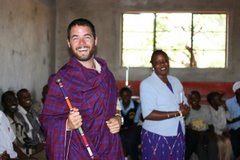
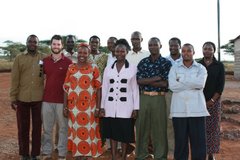
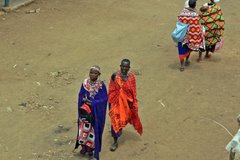

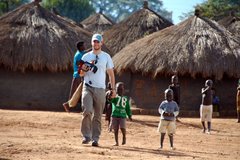
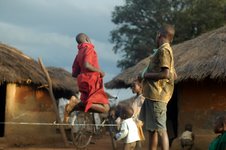

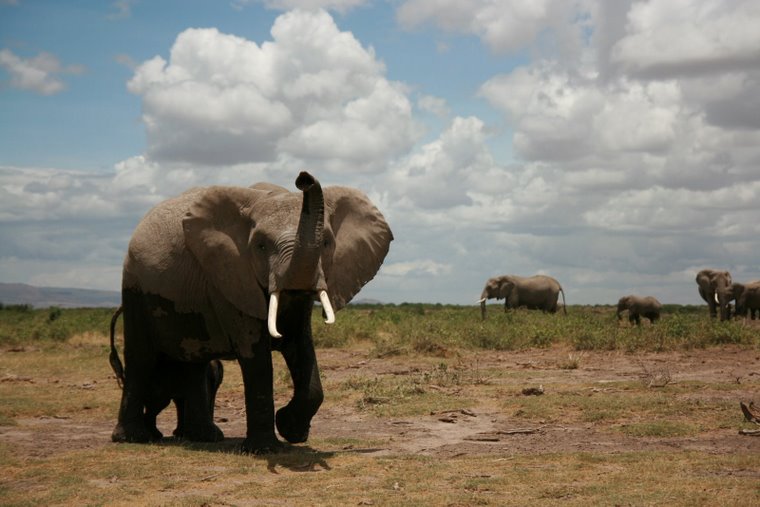
No comments:
Post a Comment